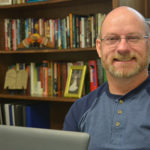WACO—Everyone has a name that identifies and distinguishes them—including the poor and marginalized, said Jimmy Dorrell, founder of Mission Waco/Mission World.
Dorrell spoke to the organization’s annual banquet, which took its theme—“You say you care about the poor? Tell me their names”—from a quote by Craig Greenfield, founder of Alongsiders International.
 “There is a big step from general caring to knowing the names of people,” Dorrell said. “There is nothing more life-changing than knowing the names of other folks. The reality is when you know someone’s name, they become more real, more special.”
“There is a big step from general caring to knowing the names of people,” Dorrell said. “There is nothing more life-changing than knowing the names of other folks. The reality is when you know someone’s name, they become more real, more special.”
Amy Sherman, a senior fellow at the Sagamore Institute for Policy and Research, asked each guest at the banquet to consider the idea of being “my brother’s keeper” in relation to working with the poor.
Most cultures and their leaders, secular or religious, agree one should take care of another when in need—to be one’s “brother’s keeper,” she said. However, they disagree on the best way to do it.
Sometimes being one’s brother’s keeper means defending someone, being an advocate for someone without a voice, or standing up for someone who has been mistreated, she said.
“Other times, being our brother’s keeper means letting someone who feels utterly anonymous know that they are actually seen, heard, named,” she said. “Being our brother’s keeper means knowing our brother or sister’s name.”
Stepping up
To be one’s brother’s keeper involves stepping up, overcoming selfishness and investing in people’s lives, Sherman added. It takes risk, and it takes power that should be familiar to Christians.
Sign up for our weekly edition and get all our headlines in your inbox on Thursdays
“We find the strength to be our brother’s keeper when we really internalize at a deep level that our Lord Jesus is our keeper,” she said. “The Lord Jesus is a great example of a keeper.”
Sherman referenced two biblical examples. The Hebrew word shamar is used throughout the Old Testament to describe God as keeper, according to Sherman. By God’s mighty power, he “kept,” or protected, the Israelites in their struggles against foreign nations, as chronicled in the book of Joshua, she noted. Sherman also referred to Psalm 77:4, where a derivative of the Hebrew word is used, noting God delicately kept open the psalmist’s eyelids.
Tender preservation
“The Lord is a keeper of might and power, but he is a keeper who is gentle and has tender preservation,” she said.
Sherman emphasized the importance of knowing God as a keeper. Through that understanding, a believer finds courage and strength to be generous and to help the poor. Christians can find the strength to give of themselves for the keeping of the poor because they know God will keep them, she said.
“With our names, we are known,” she said. “We are seen. We have a keeper. We have a caretaker.”














We seek to connect God’s story and God’s people around the world. To learn more about God’s story, click here.
Send comments and feedback to Eric Black, our editor. For comments to be published, please specify “letter to the editor.” Maximum length for publication is 300 words.